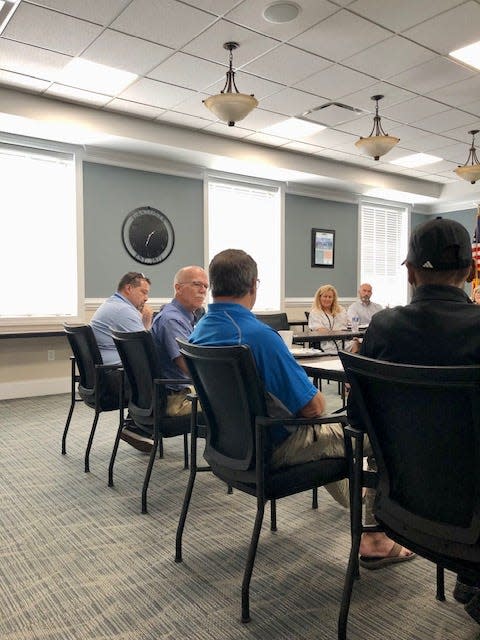Bill headed to the Senate could impact Gastonia voters

- Oops!Something went wrong.Please try again later.
The North Carolina General Assembly passed a bill at the Aug. 16 meeting which, if passed in the Senate, will change Gastonia’s local elections system.
Gastonia officials believe the move could have serious implications on voter turnout and representation in the city.
At a special meeting on Monday, Aug. 21, the city of Gastonia voted yes on a resolution to oppose Senate Bill 169, which specifically includes an amendment to change the way local officials are elected in the city.
The bill, which the city was not made aware of until it had passed in the General Assembly, was written by Senator Steve Jarvis (Republican) as a local bill regarding the annexation of satellite land in Davidson County.
Jarvis created the bill as a technical correction to a bill he had created last session regarding Davidson County.
The bill was voted over to the house in May, where it gained two additions before coming to a vote on Aug. 16.
Prior to the final vote, the bill was amended in a committee meeting by an unconfirmed member of the House of Representatives, to include the new language about Gastonia.
The new language in the bill would switch Gastonia to a voting system that only allows voters to vote for the single council chair representing their ward.
The city currently uses a nonpartisan election system in which every Gastonia resident can vote for each of the six council chairs.
Gaston County’s House representatives Donnie Loftis, Kelly Hastings and John A. Torbett, all Republicans, voted yes on the amendment to this bill in the House.
Hastings stated that he voted yes on the bill because he, “didn’t have anyone call and complain about it before-hand... I knew the bill would have to go back to the Senate to be analyzed again.”
Hastings also stated that he voted yes on the bill despite the addition of this new language because he didn’t want to kill the base bill to which this language was attached.
First-year Senator Brad Overcash (Republican), who represents Gaston County, stated that the bill would likely come before the Senate mid-September for a concurrence or non-concurrence vote, though the bill has already passed in the Senate once.
The author of the bill, Jarvis stated that he was not fully aware of the content of the additions to his bill, calling it, “a train that has picked up a few more cars.”
Jarvis said he still intends to vote yes on the bill.
“All I’m interested in is getting my bill across the finish line that has my provision in it, and if it would end up hindering that, you know, I want to see it go through. I’ve got to get that bill through because that’s a technical correction to a bill that I introduced last session,” Jarvis said.
Jarvis, Overcash and Hastings did not comment on the impacts that legislation requiring a city to vote by ward can have on the voting process.
As of the time of publishing, Loftis, Torbett and Gaston County’s other Senator W. Ted Alexander (Republican), did not responded to requests for comment.
In the resolution regarding the bill, the city states, “The City of Gastonia believes that the benefits of at-large voting outweigh those of single district or ward voting in that number of candidates available for election tends to be larger, vote trading between councilmembers is lessened,”
The city added that, “council members in at-large systems rise above the limited perspective of a single district or ward because they are elected by and accountable to the entire electorate and therefore prioritize the good of the entire community rather than only the good of one Ward.”
"The current system has been in place for 60 years, and we feel it is the best system for a city our size. We have low voter turn-out as it is. I've looked at the numbers. in the last municipal election, we had 5,103 voters, so, if you divide that by six wards, that's less than 1,000 voters coming out to make a decision," said Councilwoman Jennifer Stepp. "On top of that, now you're only coming out to vote for one person? That turn out is going to be even lower."
Gastonia Councilwoman Donyel Barber also discussed election complications stating that elections can be expensive.
"That could be a waste of taxpayer dollars, you know, having people come out only to vote for one person," Barber said.
A topic of discussion among City Council during the special meeting was the possibility that if each council person were only representing their ward, they could all be competing for funding to complete projects in their ward alone rather than considering the well-being of the city as a whole.
To conclude the resolution, the city states that the bill will cause citizens to feel, “disenfranchised and unrepresented by a majority of the council members who will still be able to vote on major issues affecting the safety, health, and welfare of those citizens.”
According to Stepp, "These things usually happen because a local government asks the delegation to do it, the delegation does not usually take it upon themselves to make those decisions for the local government. We did not (ask); we were unaware."
If this bill passes in the Senate, it will take effect in Gastonia starting in 2025, at which time three of the six wards will be able to vote for their representative.
The other three wards will be able to vote for their representative in 2027.
"I'm hoping that it's not too late, and they'll at least hit the pause button to step back and have some conversations with us instead of just ramming this through," Stepp said.
This article originally appeared on The Gaston Gazette: Gastonia lumped into a bill that would change local voting
